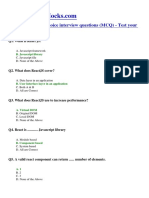0 ratings0% found this document useful (0 votes)
75 viewsPromises in JavaScript
Javascript
Uploaded by
SowmyaCopyright
© © All Rights Reserved
Available Formats
Download as PDF or read online on Scribd
0 ratings0% found this document useful (0 votes)
75 viewsPromises in JavaScript
Javascript
Uploaded by
SowmyaCopyright
© © All Rights Reserved
Available Formats
Download as PDF or read online on Scribd
You are on page 1/ 8
Javascript
Promises
Q&A
Ge»
What is a Promise in JavaScript?
NTR Moose key ra eo ae Ra ere Reroraa ll oRemrellUc
CORe Lae Zaria congo) cel oad Neon Tie Re NoVA ae Re aoe oe
operations more easily and avoid callback hell
function fetchData() {
return new Promise((resolve, reject) => {
Past Omens
const data = { message:
resolve(data) ;
fetchData()
.then((result) => {
onsole. log(result.message) ;
})
-catch((error) => {
CEC lagela (ial
yi;
How do you create a Promise in JavaScript?
Nol Rero Re rol Rear MU ale Rta Maca Mtoe el Coe Rae]
argument, a function (executor), which has two parameters: ‘resolve’ and “reject
Nolte] MEN MAAR Ne Lara coal Ce teat ce Soi Kel Mt yrs
MUNI a fel]
const myPromise = new Promise((resolve, reject) => {
can as
TOL
ees
ictal C-Lal col
}
hi
What is the purpose of ~async/await™ in
JavaScript?
The “async/await” syntax is used to simplify working with Promises. It allows you
to write asynchronous code that looks more like synchronous code, making it
easier to read and maintain. The ‘async’ keyword defines a function as
asynchronous, and ‘await’ is used inside such a function to wait for a Promise to
Smee
How do you define an “async” function in
JavaScript?
Noreen ia Rea Re MUM eh aCMeS Tle CMR sm eRan taco)
declaration. An ‘async’ function always returns a Promise.
Smee, CS eg eee mee
const result = await somePromise;
ae cad
+
What is the difference between ~Promise.all()~
and ~Promise.race()~?
Soak OMe Cle Marsa aK AceH OU Me at Maccctlaeye Keli
Clan ace Ma Recolor olna Mcole-1 OMe CN OlMe aN Rea Noe a Marea oda)
an array to resolve or reject, and it returns the result or error of the first Promise
that settles.
How do you handle errors in “async/await ~?
Nero MU Kem (elm ore aoe TMS Vee Ma Re celd
occurs within the “try” block or any awaited Promise rejects, control is passed to
Takeo lle ANN Roa Staats
async function myAsyncFunction() {
Aiea Se
(eT CTlea
pane 180 Clee ee
}
i
What is Promise chaining?
aru oan Roe UMN one Maat lke Tareas
operations together using the .then() method. It allows you to perform a series
of asynchronous tasks sequentially.
Uae eee Oe ee
ict 1 ee)
pares eee soe) ee
yi
How can you achieve parallel execution of
gad
You can use “Promise.all()” to execute multiple Promises in parallel. Each Promise
MaRCRRe Lice NAAT aCciary Alar Mole a AMC UNAM neRe Tne elke cy
rN
const promises = [promisel, promise2, promise3] ;
eee ee UM Tae) ee eS ee
aH
How can you cancel a Promise or cleanup
resources when it's no longer needed?
You can use an “AbortController and the ‘abort’ method to cancel a Promise or
cleanup resources associated with it. The Promise can catch the “AbortError and
handle it gracefully
ere ae aCe Te adele atte O
const signal = controller.signal;
const myPromise = new Promise((resolve, reject) => {
signal.addEventListener('abort', () => {
reject(new DOMException('Aborted', ‘AbortError'));
sai
ai
Courage cite tad
Explain the concept of 'Promise.race()' and
provide a use case for it.
Tolan Ngo lel OM oN Mol Mel ole Se oLoa Nel Mela emia Macelaal MaMa Re icon
Re eM aU Roma AUER na roles ore omen MeN So)
set a maximum execution time for an asynchronous operation.
Promise. race([myPromise, timeoutPromise]).then((result) => {
pa eee ec 00a eee
ai
How can you implement retry logic using
ge RTS
caste tee leper (yap)
idler) epee)
[oho ROC lacl if
SOO ae
console. log('Retrying...')
return retryOperation(maxRetries - 1)
cae
COMMENT ®
Add your suggestion in the
comments
Sy
Mario Ruci
Sr. Fullstack Software Engineer
@ scan ME
You might also like
- Advanced JavaScript Cheat Sheet - Zero To MasteryNo ratings yetAdvanced JavaScript Cheat Sheet - Zero To Mastery150 pages
- Programming TypeScript Making Your JavaScript Applications Scale 1st Edition Boris Cherny all chapter instant download100% (3)Programming TypeScript Making Your JavaScript Applications Scale 1st Edition Boris Cherny all chapter instant download40 pages
- Typescript Practice - Exercises 1. Enumerator: Pricelist (No ratings yetTypescript Practice - Exercises 1. Enumerator: Pricelist (4 pages
- Namaste Frontend System Design CurriculumNo ratings yetNamaste Frontend System Design Curriculum12 pages
- Dokumen - Pub - Javascript For Impatient Programmers Z 5657019100% (1)Dokumen - Pub - Javascript For Impatient Programmers Z 5657019872 pages
- JavaScript Array Methods - Shiksha OnlineNo ratings yetJavaScript Array Methods - Shiksha Online10 pages
- JavaScript Wars - Code - by Christopher TopalianNo ratings yetJavaScript Wars - Code - by Christopher Topalian600 pages
- What's New in Angular 17 - Angular 17 - Yaay or Naay - by Thamodi Wickramasinghe - Feb, 2024 - Bits and PiecesNo ratings yetWhat's New in Angular 17 - Angular 17 - Yaay or Naay - by Thamodi Wickramasinghe - Feb, 2024 - Bits and Pieces17 pages
- MERN Stack Interview Questions - CodeHypeNo ratings yetMERN Stack Interview Questions - CodeHype6 pages
- V2 Holyjs 2019 - Nestjs. Tried To Shift in 80 HoursNo ratings yetV2 Holyjs 2019 - Nestjs. Tried To Shift in 80 Hours207 pages
- React JS Multiple Choice Interview Questions (MCQ) - Test Your React JS Knowledge100% (1)React JS Multiple Choice Interview Questions (MCQ) - Test Your React JS Knowledge6 pages
- How To Bootstrap Your Career in Web Development: The Ultimate GuideNo ratings yetHow To Bootstrap Your Career in Web Development: The Ultimate Guide36 pages
- The JavaScript Promise Tutorial _ Adrian Mejia BlogNo ratings yetThe JavaScript Promise Tutorial _ Adrian Mejia Blog22 pages
































































